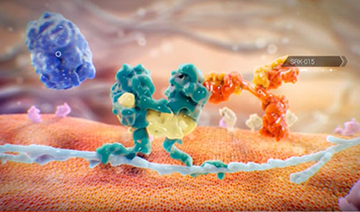Data demonstrate improvement in muscle pathology and function following experimental SCI and expands potential opportunities for SRK-015 into a wide range of neuromuscular disorders
The Miami Project researchers, in collaboration with Scholar Rock, a biotechnology company focused on discovering and developing drugs that selectively target growth factors in the disease microenvironment, today announced the presentation of data from its SRK-015 antibody program, that demonstrate beneficial effects in a preclinical model of spinal cord injury.
The study results, presented at the 35th Annual National Neurotrauma Symposium, revealed that the proprietary antibody, which possesses a unique ability to selectively block intramuscular activation of myostatin, improved key characteristics of muscle pathology that result from severe contusion injury to the spinal cord. More specifically, the antibody decreased muscle atrophy, reduced fat infiltration into muscle, and improved muscle function. SRK-015 is Scholar Rock’s lead antibody drug candidate which is initially being developed for the improvement of muscle strength and function in patients with Spinal Muscular Atrophy (SMA).
“We appreciated our fruitful interaction with the leadership and scientists of the Scholar Rock team, enabling the exploration of an innovative therapeutic approach to spinal cord injury. Maintaining muscle mass both above and below the level of spinal cord lesion is needed to preserve health and function of persons with spinal cord injuries both immediately following injury and throughout the lifespan,” said Mark S. Nash, PhD, Professor, Departments of Neurological Surgery and Physical Medicine & Rehabilitation, lead investigator of the study. “We have been interested in myostatin for some time given its role as key negative regulator of skeletal muscle mass in many diseases and degenerative processes. By selectively inhibiting myostatin activation, SRK-015 offers the opportunity to address secondary health and functional decline associated with the musculoskeletal, neuromuscular and cardioendocrine systems.”
“The data from our collaboration with Drs. Nash and Gregory Bigford at The Miami Project support our belief that, when applied to appropriate disease settings, highly specific inhibition of myostatin activation may result in important clinical improvements in muscle pathology and function,” said Nagesh Mahanthappa, PhD, President and Chief Executive Officer of Scholar Rock. “These data, in addition to our recent findings in a genetic model of SMA, demonstrate the potential of SRK-015 to address unmet needs in the treatment of a broad set of degenerative neuromuscular conditions.”
The poster presentation by Dr. Bigford, entitled Pharmacological Inhibition of Myostatin with mSRK-015P in a Contusion Model of Spinal Cord Injury Improves Key Characteristics of Muscle Pathology, reports these findings in a preclinical mouse model of spinal cord injury:
- Masses of the soleus and gastrocnemius, which are muscles below the level of the experimentally induced spinal cord lesion, in the antibody treated group were significantly greater than the non-treated group following experimental injury, and not significantly different from uninjured control.
- Lipid infiltration into muscle associated with spinal cord injury was significantly reduced in muscles from the antibody treated group compared to the non-treated group.
- Improvements in muscle health were associated with improved grip strength and functional scores in antibody-treated animals.
SRK-015 is a selective and local inhibitor of the activation of latent myostatin. Myostatin, a member of the TGFβ superfamily of growth factors that is expressed primarily in skeletal muscle cells, is a genetically validated target that regulates muscle mass. Scholar Rock is actively working to advance SRK-015 into clinical trials to improve muscle strength and motor function in patients with Spinal Muscular Atrophy (SMA). Scholar Rock plans to develop SRK-015 both in combination with therapies aimed at correcting the underlying genetic defect and as monotherapy in certain subpopulations of SMA patients. SRK-015 is an investigational drug candidate. The effectiveness and safety of SRK-015 have not been established and SRK-015 has not been approved by the FDA or any other regulatory agency.
Scholar Rock is discovering and developing a pipeline of innovative new medicines to treat a range of serious diseases with high unmet medical need, including neuromuscular diseases, cancer and fibrosis. By focusing on the newly elucidated biology of growth factor activation, Scholar Rock has developed new insights which allow us to selectively target growth factors in the disease microenvironment, aiming to achieve therapeutic effects specifically at the source of disease. Our proprietary technology enables the development of innovative medicines that modulate the supracellular activation of growth factors and unlock the vast therapeutic potential of targeting growth factors to treat disease, and deliver new solutions for patients. Scholar Rock is led by a highly-experienced management team of leaders who have built successful biotechnology companies, and is backed by leading investors.


